YEALD NEAWS
YEALD BUSINESS NEAWS UPDATE 2025 .1




Are you ready for an international perspective? Let’s broaden our horizon and discover horticultural investments from around the world!
In this edition of YEALD NEAWS we take a look at investments in horticulture in Africa, the UK and the United States of America. High tech greenhouses are a global phenomenon. More and more investors and companies all around the globe see the potential that sustainable high end greenhouses achieve.
First, we go to Birchington, UK, to a site that has been cultivated for over 6,000 years. Thanet Earth is building its seventh greenhouse, completing a strategic plan that’s been in the works for twenty years. Now it is time for the next steps in becoming a multidimensional company, that handles its own growing, distribution and marketing, to mention a few activities.
After that, we stay on the British Isles for a minute, talking with Oasthouse Ventures. This investment company wants to do things a little better than usually seen, especially in the area of sustainability. Its focus is on developing low carbon infrastructure from idea to finished company and since 2015 they are also in the horticultural
“We want to be the most trusted horticultural company.”
The UK needs to build and develop sustainable greenhouses.
business. Starting with greenhouses in the UK, they’re now also developing and co-owning a greenhouse venture in Virginia, USA.
Finally, we go to Africa, where Olav Boenders and Pim de Witte recently sold one of the world’s largest flower propagation companies of cuttings after 25 years of building and developing horticulture in Uganda. Wagagai will now pass over to Selecta, which was a logical yet complicated process. Olav talks about entrepreneurship in Africa, investing in local expertise and infrastructure and knowing when to hand over your business. Three fascinating companies operating on a global scale, all with their own strategy, vision and characters running the show. It always fascinates us how many ways there are to operate a successful company within horticulture, and we’re proud to play our own part in some of these processes.
We hope the stories we present in this new edition of YEALD NEAWS will inspire you and help you develop your own strategies and vision on horticulture! <<
From prioneer to market leader in Uganda
New team members
We’re pleased to introduce our new colleagues.
“WE WANT TO BE THE MOST
HORTICULTURAL COMPANY IN THE UK”

We love it when a plan comes together. Especially a plan with a huge scope like Thanet Earth in the United Kingdom. Between the initial pitch in 2005 and now, the horticultural company is targeting to become a top 10 fresh produce business in the British Isles and is currently building her seventh greenhouse. But the success didn’t come without its challenges, nor will it be only smooth sailing from here on out.
The concept of Thanet Earth was brought to the Fresca Group in 2005. “Combine the knowledge of Fresca with UK retail and Dutch greenhouse expertise of A&A Growers”, tells Chris Butler, managing director of Thanet Earth for his sixth year now. “Our first objective was to find a suited site for the greenhouses.”
Key requisites for the site were easy access to the European mainland, a good local labour market, local permission and the right light levels. “We ended up with a great location near Birchington, next to Canterbury Road A28.

“People have been growing here for more than 6,000 years”
It’s one of the best sites in the UK to grow fresh produce.”
And, Chris added, also a site with centuries of agricultural history. “During excavations archaeologists discovered the earliest known cultivation site in the UK, right underneath the soil we planned our construction on. People have been growing here for more than 6,000 years. Agricultural conditions at this site have really stood the test of time.”
Right now, Thanet Earth is at 165 million pounds of revenue. “Our goal is to grow to 250 million pounds a year”, says Mark Huckstep, Finance Director since 2009. “We started out with three Dutch growers, each of them operating their own greenhouse within Thanet Earth. Production started in 2009. We added a tomato greenhouse in 2013, added another tomato greenhouse and a cucumber one in 2016 and 2017, and now TG7 is under construction.”
As of the seventh greenhouse, Thanet Earth accomplished the initial scope of the project. “But with 250 million pounds of revenue a year in mind, we are still on the lookout for new sites and are keeping an eye on other production sites”, Mark tells us. “For instance, we’ve acquired a lettuce greenhouse recently. One of our fourteen strategic pillars is to move into new produce as well.”
“It’s important to signify that we’re not just a grower”, Chris adds. “We are also a distributor, packer, importer and marketeer as well, with an end-consumer oriented


approach. This is a big difference with the business models we see a lot on the European mainland, where growers grow what they want and just sell it on the market. We tune the crop and the varieties according to our grower and retail forecasting, always with the end consumers in mind. It’s an art we’ve developed through trial and error.”

“It’s important to signify that we’re not just a grower”
Thanet Earth developed the full scale of capabilities to service the UK market, no matter the approach of the different retailers. “Some ask for a whole basket and category management approach ”, explains Chris. “Others require a lighter touch approach . All options are open for us, so we can maximise market opportunities. One of the important principles we have, is to always be fully transparent to our customers. We must bring them on our journey, for instance on pricing. That way, you can explain fluctuations in price more easily.”
The UK had its fair share of challenges for the fresh produce market, as did the European mainland. “We have had the same energy crisis, labour shortages and had to deal with Covid as well”, Mark explains. “Besides that, Brexit complicated matters. We didn’t realise it’s impact
at first, which mainly cut into our available workforce. But through various channels of lobbying, the industry has had some concessions from the UK government to take the extremes away, such as the seasonal worker scheme.”
“Part of our strategy is Factory of the Future”, Chris adds. “We try to freeze labour inflation by introducing automation in various elements of the production chain,


Britain’s leading glasshouse complex is located in East Kent. The glasshouses produce around 400 million tomatoes, 33 million cucumbers and 20 million peppers each year. Innovation, environmental concern and a focus on quality combine with cutting-edge technology, international expertise and the best growing conditions in the UK to produce unrivalled taste on a commercial scale.

for which we use off the shelf automation projects. This is especially effective where there are predictable and repeatable tasks. We also invest in software that helps with forecasting, like Source.ag, and inhouse built applications to improve the delivery of logistics between greenhouse and packhouse facilities.”
Integrated business model
Being more than a grower helps stabilise the streams of income in the fresh produce market for Thanet Earth.
“We have an integrated business model”, Chris explains. “Everything is in house, from growing to packing to marketing. This helps us maximise the opportunity in the marketplace, where growing local for local and being consumer focused are the trends.”
“For instance, we’ve recently opened a secondary packaging site, which helps us segregate imported tomatoes from locally grown ones”, Chris continues. “This helps us solving the problem of managing the virus risk.”
Another big step is the cooperation between Bryte growers in The Netherlands and A&A Growers. “Having experienced horticultural entrepreneur Tom Zwinkels (Bryte) in our board helps us a lot”, Mark tells us. “His expertise and experience are of great benefit for our business.”

“Everything is in house, from growing to packing to marketing”
A multidisciplinary company
Thanet Earth has reached the number of greenhouses it had originally planned in 2005. But development doesn’t stop here, and big steps are being taken to grow the company. From joining forces with big names in the industry, like Bryte, to tapping into specialised expertise for the expansion of Thanet Greenhouse 7 with YEALD, Thanet Earth is transparent, ambitious and market driven. This has given the company a unique position within the fresh produce market in the United Kingdom but makes it a significant player in the whole of Europe. Supported by fourteen clear strategic pillars, Thanet Earth is a well thought out concept turning into a multidisciplinary company of high-quality fresh produce for the British market. “We want to be the most trusted fresh produce business”, Chris concludes. “For our people, our customers and our community in which we operate. In the end, that’s the licence to produce, especially in the UK.” <<
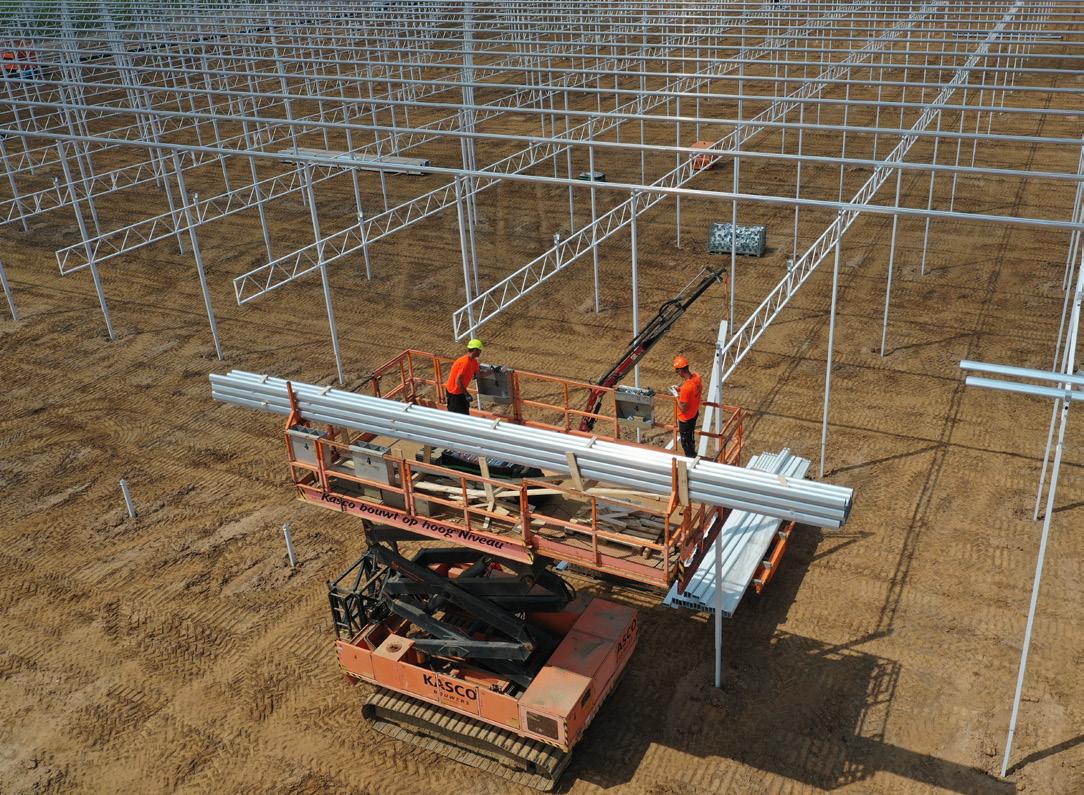
How can we produce food differently? And more sustainable? That’s a question that popped into Andy Allen’s mind around 2014. At that moment, he was working for four years with Oasthouse Ventures, a developer of low carbon infrastructure around the world. A company he started with two co-investors, Simon and Oliver. That’s when a greenhouse crossed their path.
Honest and profitable businesses
“We are a small team, but we manage big projects”, Andy explains about Oasthouse Ventures. “We want to do things differently, more sustainable, while still founding profitable businesses. Our added value is taking an idea for an energy-related project and developing it into a operational business model.”
Oasthouse Ventures has done many projects, ranging

We are a small team, but we manage big projects
from solar and charging stations to energy storage solutions and building development. “We like to be a first mover in industry standards. Develop big projects that align with our vision of a more sustainable world. We want to build honest and profitable businesses that make a difference for the world and society.”
Do things better
The high-tech greenhouse is one of the ultimate low carbon infrastructures and has already proven itself as generator of several profitable business models around the world. No wonder then that Oasthouse Ventures and the greenhouse concept were bound to meet.
“Food production needs to change”, Andy tells us. “And we like trying to do things a bit better than before.
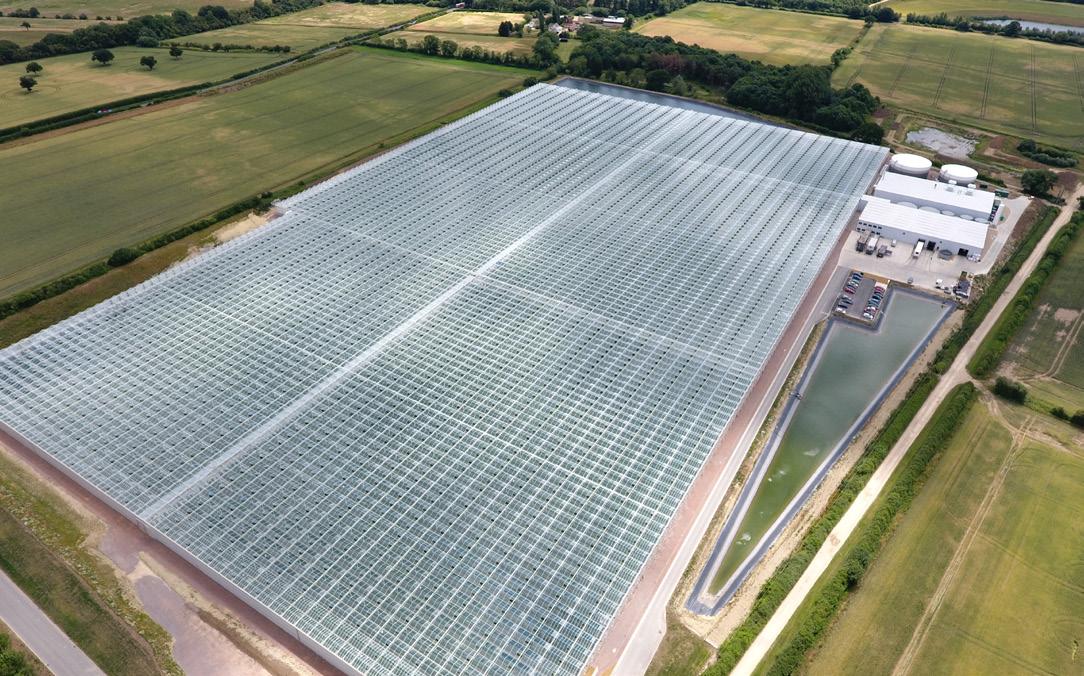
Greenhouses are fascinating. They require less land, less to no chemicals and even no fossil fuel to generate a high yield of fresh produce. If done right.”
Of course, in the horticultural world – and especially the Dutch – there has always been scepticism when it comes to outside investors in the industry. They lack the ‘green fingers’, as the Dutch say, the intuition to be able to grow quality crops in a high tech greenhouse.
“Well, we focus on the first part of the greenhouse project”, Andy counters. “We develop the production facility and the company. Basically, we build the car and deliver it to investors or companies that can just step in and grow the fresh produce in the greenhouses. That’s how we built the sewage heated greenhouses in the UK in 2019.”
New challenges
Oasthouse Ventures partnered with YEALD along the way. “They provide us with extensive knowledge of the industry, expertise and a huge network. We know about development and energy in different countries, YEALD help us bring our developments to the market, and introduce us to everyone in the greenhouse industry that we don’t know as non-growers”.
“You have to be a bit crazy to take these kind of projects on”, Andy continues. “But we love it. We always find new challenges in new projects. To build a greenhouse, especially a low carbon one, is a risky business, very expensive, complex and time consuming.”
It’s clear that the people at Oasthouse Ventures are driven by three key motivators: a combination of a fascination for low carbon infrastructure, a desire to create a better and more sustainable way of doing business and, thirdly, a love for their country. “I don’t believe we build and develop enough in the UK”, Andy laments. “And this lack of

“You have to be a bit crazy to take these kind of projects on”
development saddens us. For us, that’s a motivation to do things better, even if it is costly and complex.”
Things go differently in the US, as Andy and his group found out. “Yes, the US is way friendlier for businesses and investors. We had already developed many solar projects in the US when we started to consider could we do a greenhouse development. If we did do one, how would we do it? Where? With what energy model? For what benefit for the retailer and the customer?”
“The first goal was to determine a location”, Andy explains. “It had to be East coast because of the big markets, we had to take growing and lighting conditions in consideration and we wanted to use Dutch technology. Finally, we settled on Virginia.”
The approach was different than the greenhouses developed by Oasthouse Ventures in the UK. “We part own it, so there’s more involvement”, Andy tells us. “We love

a challenge and to learn new subtleties. But we always look out for potential investors. As a company, we have big ideas and big plans, and we need investors help to achieve those goals.”
In the meantime, phase 1 of the facility in Virginia will be operational in 2026, but it won’t be the end if it’s up to Oasthouse Ventures. The US has become more and more dependent on imported fresh produce from Mexico and Canada, so these projects help restore food security. But the shorter transportation times are also more sustainable and will get consumers a produce with better taste, nutrition and quality.
“We see an appetite for investment in these kind of projects in both the UK and the US”, Andy explains. “The hype around vertical farms deterred some, but investors with a long term horizon and an eye for low carbon businesses always say yes to good projects. Greenhouses raise a lot of interest. It’s more niche, but because we work with proven Dutch technology operated correctly, you’ll have a good business.”
Greenhouses are essential
Which brings us back the UK. “We are developing a 40-hectare low carbon series of greenhouses in Essex at the moment. It’s close to a huge waste firm, so we can use their heat and CO2. It also has high levels of sunshine

“Investors with a long term horizon and an eye for low carbon businesses always say yes to good projects”
and it comes with an old RAF hangar that can house an indoor leafy green farm.”
“Right now it’s in the planning phase and we are still looking for investors. It will help the UK buffer against price spikes on imported fresh produce from the mainland and Morocco, and generate local jobs and opportunities. Our added value is the time you save when you invest in this company. It saves you five years of development, risks and management, plus we already thought out the operational set-up, the required technology and potential markets.”
And of course, as always with Oasthouse Ventures, there’s also the bigger picture. “The UK needs to develop and build these kind of facilities. Closed environmental growing of fresh produce in high tech greenhouses is the future of food production. As climate changes becomes more serious, these kind of production facilities are essential for fresh food supply. That’s why we believe in horticulture.” <<

Oasthouse Ventures develop businesses which have a positive impact on the world. The team is passionate about starting and growing businesses and they continue to work with and invest in people and ideas which reflect their sustainable values. Oasthouse Ventures is founded by Andy Allen, Simon Turner and Oliver Soper.

“There was nothing at all, nada, just bush, chickens, goats and a lot of mud” This is how Olav Boenders described the Wagagai site when he and his wife Marion arrived in Uganda in November 1999 to support the De Witte family in setting up the –then – rose nursery. Now, more than 25 years later, Wagagai is a very successful cutting company in Africa, taken over by Selecta and the future looks bright. How do you achieve that?
Olav is a man who has experienced everything in horticulture. Most of it twice. Before his adventure in Uganda, he had been active in Kenya for Deliflor for five years. “My father was a development economist and I had also studied tropical agriculture and development economics,” says Olav. “Pim and his father Wim de Witte had leased land in Uganda to build Wagagai, but that turned out to be quite a complex operation. They asked my father and me to help organize the finances and operations.”
Not a sustainable business
And so, in 1999, Olav arrived on a number of empty acres on Lake Victoria, an hour’s drive from the capital Kampala. “It took another two years for the financing to be arranged, while the greenhouses had already been ordered,” says Olav with a grin. “In January 2000, the first

roses were exported. In the days when we grew roses there, the price went from twelve cents per stem to six cents per stem. That was not a sustainable business for us.”
Soon after starting up Wagagai, former employer Deliflor came to Olav to see if they could also produce chrysanthemum cuttings. “Uganda really has the perfect climate for chrysanthemum cuttings, that was already known,” says Olav. “High night temperatures and high humidity. That cultivation was an immediate success. Such a success, in fact, that we started leasing additional land to create extra capacity, and we also started testing how poinsettia and begonia cuttings were doing. Well, that went great too.”
The logical choice was made. Wagagai became a cutting company. “It is stable trade with long-term contracts.

Moreover, in addition to Deliflor, we had also attracted Selecta as a customer and we cultivated cuttings for both. That strategy worked much better than growing for the volatile day trade of rose cultivation.”
Zero experience with horticulture
Wagagai rolled out a clear vision for the company’s sustainability. “We were able to split the overhead costs between two customers, which we had brought together,” Olav explains. “We did something that both companies could not do themselves at the time, namely grow cuttings on thirty to forty hectares. We work as efficiently as possible without sacrificing quality. Top quality grown in the most sustainable way possible for an affordable price, that was always the starting point.”
“In Uganda, at the time we started, there was no knowledge about cuttings, and no infrastructure,” Olav continues. “Zero experience with horticulture. The international airport also had no refrigeration facilities, just to name a few. We started training people ourselves. A successful horticultural company in Africa stands or falls with the quality of the local operational management, we soon learned that.”
“In addition, we formed the Ugandan Flower Exporters Association with about twenty floriculture companies active in Uganda. Uganda is very entrepreneur-friendly and has a positive attitude towards investors, so by working together as companies we were able to solve many challenges together with the Ugandan government. In addition, we joined forces in R&D, trials and testing, which has strengthened the sector.”
Strong local management
In addition to educating people and investing in the business climate in Uganda, Wagagai always took good care of its people and the community. “From the beginning, we wanted to empower our people,” Olav explains. “NGOs have an important role, but with our background in development economics, we also knew that companies play an important role in the growth of prosperity in a country like Uganda. Even when we were not making a profit yet, we invested in childcare, a

“Dutch horticulture can continue to play an essential role internationally”
small clinic and social activities on the farm, Marion played an essential role in that.”
From 2009 onwards, Wagagai started to make a profit. Operationally, the company was in a good position with a strong local management team. Olav returned to the Netherlands in 2011, Pim in 2014. “We were able to facilitate everything from the Netherlands, even though we still flew back six to eight times a year. When Covid struck and we also made the transition to digital communication, we noticed that thanks to our strong management team, a lot could also be organized via online calls and email. A crisis like this makes you realize that you have much more knowledge and skills in-house than you assumed.”
What also changed is the energy that Olav and Pim were still able to put into Wagagai after 25 years of entrepreneurship. “Doing business in Africa is hard days,” says Olav with a laugh. “And we had no direct succession. We got into a conversation with YEALD. Covid and the war in Ukraine slowed down the processes, but in the end we

found the perfect party in Selecta to take over Wagagai and put new energy into it.”
“I think Selecta took over the company at the right time. They come up with a new long-term vision and strategy, with which Wagagai will only move forward,” says Olav.
“Without YEALD, we would never have succeeded in this process. We are really happy with what they have meant to us, because selling a company is really a specialty.”
And so a long African horticultural adventure is slowly coming to an end for Olav. A man with heart and passion for horticulture, and also a lot of experience. “If you operate internationally, it is important to make a good mix between the creative Dutch entrepreneurial drive and the local culture. A strong local management team is really indispensable, that is the lesson we have learned with Wagagai. This also means that as a Dutch entrepreneur you sometimes have to be patient and understand when things are handled differently than you are used to.”
And Olav is sure that there will still be opportunities for Dutch horticulture. “There is enormous pressure on land and production worldwide. Dutch horticultural technology and production methods can play an essential role in this. Very efficient cultivation, nowadays also chemicaland fossil-free, that is the future.” <<

“It is important to make a good mix between the Dutch entrepreneurial drive and the local cultur’
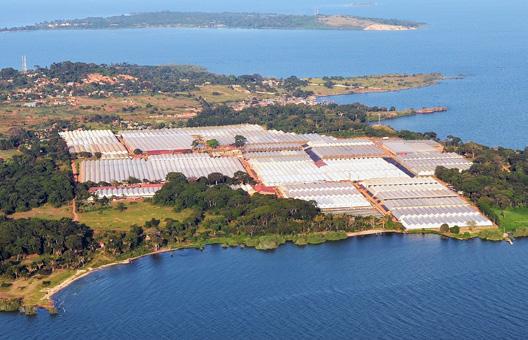

Wagagai Ltd is one of the world’s largest flower propagation companies of cuttings. They mainly produce begonias, chrysanthemums and poinsettias. Based in the south of Uganda, they supply several prominent European breeders. Yet, they are far more than just a propagation company; thanks to an extensive social programme, they have become the beating heart of the region.
Young talents are strengthening our team at YEALD. We are pleased to introduce them.
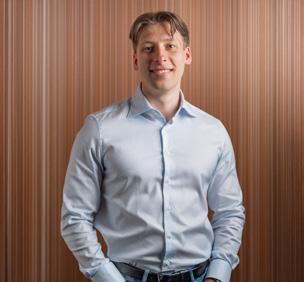
Jan is our new M&A Analyst and brings a strong financial background. He obtained his MSc in Economics and Business Economics at Erasmus University Rotterdam, where his interest in mergers and acquisitions started. During his time at ING, he gained valuable experience within the financial sector.
Jan grew up in the Westland region and has been involved in the horticultural sector from an early age. This combination of financial expertise and sector involvement makes him a valuable addition to the YEALD team. Within YEALD, Jan uses his analytical skills and financial knowledge to contribute to the growth and development of companies in a sector that is constantly changing. <<

Boswoning 4a 2675 DZ Honselersdijk
+31 174 75 25 00 www.yeald.nl
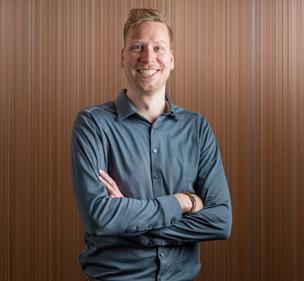
Olaf grew up in “the Oostland”, in and around his parents’ greenhouses. After obtaining his Master’s degree (cum laude) in Business & Economics at Erasmus University, he started his career at Rabobank, where he worked for five years as a financing specialist for companies in the Food and Agri segment.
His eagerness to learn and curiosity made him switch to a Westland tech startup as Business Controller. Here he learned how people, innovation and strategic choices can make companies grow exponentially. At YEALD, all these experiences come together: the entrepreneurial spirit of his childhood, the financial expertise and the insight into business innovation. As a Senior Associate, he assists companies in M&A and corporate finance processes. <<
Rob van Leeuwen
+31 6 51 62 41 08 rl@yeald.nl
Peter van As
+31 6 10 69 69 06 pa@yeald.nl
Robin Berendse
+31 6 24 20 10 10 rb@yeald.nl
Mathijs Breederveld
+31 6 42 17 03 17 mb@yeald.nl

Stijn is an Assistant Analyst at YEALD and is currently in the final year of his Business Administration studies at Erasmus University Rotterdam. With his financial knowledge and years of hands-on experience in a potted plant business, Stijn possesses a unique combination of theoretical and practical insights.
His passion for the horticulture sector and admiration for the entrepreneurs within this dynamic industry drive his work. At YEALD, Stijn aims to further develop his knowledge and skills and apply them directly to support businesses in the sector in achieving their ambitions and growth. <<
Arthur Vijverberg +31 6 40 55 04 61 av@yeald.nl
Jerry van Leent +31 6 13 90 95 45 jl@yeald.nl